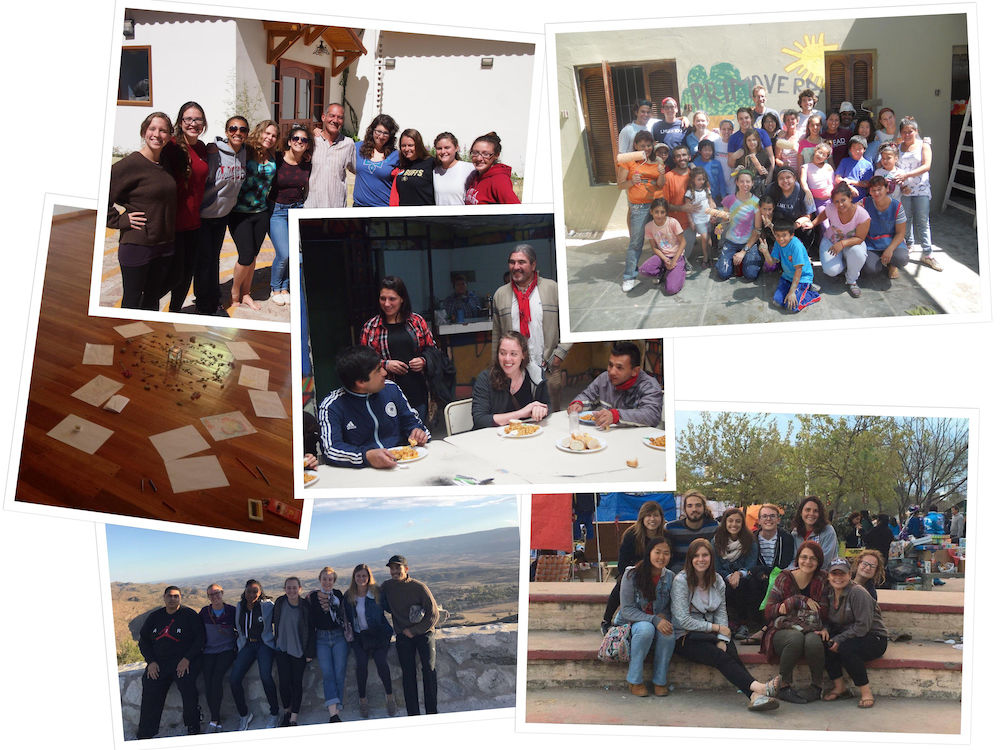A unique study-abroad program that brings students into contact not only with the needy but with God
Casa de la Mateada is a study-abroad experience, offered by our own Loyola Marymount University, which takes place over the course of a semester in Córdoba, Argentina.
The program is built on four “pillars”: Community, Accompaniment, Spirituality and Academics. Its name derives from “the beloved Argentinian drink, mate, often shared among families, friends and communities in a space of friendship and solidarity.”
Three days a week the students take classes at their Argentinian partner school, the Universidad Católica de Córdoba (UCC), a Jesuit university, like LMU.
The curriculum is mostly the same for everyone, and includes such courses as “Global Poverty,” “Sacred Place,” “Philosophy from the Periphery” and “Argentina: Language, Culture, and Literature.”
Community meetings, a time for reflection, discussion and planning are held weekly. There’s also a weekly spirituality night, an optional regular time to, for example, reflect together, meditate in silence or journal.
The time is designed to encourage students, whatever their beliefs, to connect more deeply with their experience of God or the divine.
But the heart of the program, it’s universally agreed, consists in the praxis communities that are part of the Accompaniment pillar. Praxis is the process by which a concept, lesson or skill is practiced or enacted.
A few Thursday nights ago, I arrived at the Culver City home of Jennifer Abé and Doug Christie, both professors at LMU and founding co-directors of the program.
The occasion was a reunion potluck that included 30 or so members of various “cohorts” who, over the years, had traveled to Argentina and participated in the program for a semester.
The mood was ebullient and warm, with lots of greetings between long-lost friends, note comparing and photo snapping.
Over a dinner of tacos, rice and churros, I learned that the students may or may not be fluent in Spanish, but upon arriving all are required to undergo an intense immersion in the language.
Kiana, a senior studying Psychology and International Relations, explained that your praxis might consist in an after-school program for kids aged 4-11, run by nuns. You might act as a teacher’s assistant at an elementary school, helping the students learn English. You might be assigned to La Luciérnaga, an Argentine literary magazine that covers contemporary political and social issues. In that capacity, you could find yourself cleaning floors, selling newspapers on a street corner or helping to edit.
“The pace is slow at Casa,” Kiana observed. “I learned that if I want to help someone, I need to understand the context of that person’s culture, history, community and life.”
Hope, a 2017 LMU graduate who majored in Psychology and Ethnic Studies, described Casa as “the single most beautiful experience of my life. Casa taught me about meeting people where they are, first through the experience of living in very close proximity to my fellow students. When you’re with people 24/7, you very quickly learn their strengths and their tender spots.”
As for the larger community, Hope was shocked at first. Having grown up in Santa Barbara, she’d never witnessed such extreme poverty. She’d never seen a cockroach. At one point during her praxis, she found herself with a blind couple whose hovel was infested with them.
She did what she could to clean and disinfect the couple’s home. But she also learned, “We’re not here to ‘help.’ We’re here to accompany. We’re here to listen.”
Several students spoke glowingly of the sisters with whom they’d been assigned to work. Hope, not a Catholic, said, “I was so scared the nuns would find out how little I knew. But they were wonderful. They not only taught me about Christmas and Easter, they taught me how to welcome the stranger.”
As if to illustrate, after dinner we gathered in a circle. “What lives in you now from your time at Casa?” Jennifer asked.
The noisy room became hushed as, one by one, people shared.
“I’ve learned not to look away at what is sometimes ugly and heartbreaking. I’ve learned to stick with those people who break your heart.”
“I carry a consciousness and awareness of the other, the marginalized.”
“The Casa community continues to grow, committed to social justice, which feels ever more important.”
“There’s beauty in every human connection you make, however fleeting.”
“Life isn’t meant to get easier. Beauty and joy are partners with difficulties, suffering and challenges. That partnership is where I aspire to live.”
“I feel I’ve become more myself than ever.”
“Casa changed the way I want to have relationships with people. Every interaction can be an interaction of service. Joy can be experienced in the smallest moments.”
“Casa brought me to a deep and critical awareness of God. It has deepened my prayer life.’
“I learned that growth is a really big, hard thing — and I am held.”
I thought of the evening Mass I’d attended at St. Augustine’s before coming to dinner. I thought of how the students could have been speaking for my own experience: as a member of the Church; as the writer of this column that every week enlarges and inspires me.
“I hear God saying, ‘Don’t leave my people. Keep serving.’ And I can’t do that alone.”
Heather King is a blogger, speaker and the author of several books.

